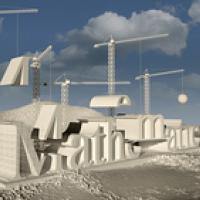
Who's watching: Can maths exist if you can't see it?
In our Who's watching project we have been exploring the physics of observers. But observations also play a role in mathematics. We often get ideas about general results in mathematics by observing specific examples and specific examples also give us a feel for what a general result really means.
But unlike physicists, mathematicians don't need to "see" something to be certain it exists. Many mathematical proofs show that a mathematical object exists by logical necessity, without actually constructing them. Are these proofs really as valid as constructive proofs? And what happens if you try and avoid them? Find out with this collection of articles.
Something from nothing? — If you can prove that a statement can't possibly be false, does this mean it's true? This article explores the law of the excluded middle and how it is used in mathematics.
Intuitive mathematics — Can a mathematical object be said to exist if you can't construct it? This article looks at a school of thought called intuitionism, which rejects the law of the excluded middle and non-constructive proofs.
Paradise lost and rescued — What kind of mathematics can you do if you insist that everything must be constructed? This article, the second part of the one above, explores constructivist mathematics.
Elusive equilibria — Acclaimed computer scientist Constantinos Daskalakis gives an example of a proof whose non-constructiveness really matters, and explains why everyone should be a constructivist.
An interview with Constantinos Daskalakis — This video interview, filmed at the International Congress of Mathematicians 2018, accompanies the article above.
Constructivism: An expert's view — Harvey Friedman, famous for his ground-breaking work on the foundations of mathematics, gives us a brief introduction to constructivism and why it is useful
Background reading and further reading

Constructive mathematics — This is one of our older articles. It also looks at constructivism, what inspired it, and where it can lead to.
The real numbers and Cauchy sequences — The real numbers, with their infinite and slippery nature, are a particular concern of constructivism. This article looks at how to define them in terms of infinite sequences of rational numbers.
Maths in a minute: Truth tables — A quick look at those indispensable tools of binary logic and how the law of the excluded middle fits into it.
Maths in a minute: Chomp — A great example of a non-constructive proof involves a game of maths and biscuits.
This package is part of our Who's watching? The physics of observers project, run in collaboration with FQXi. Click here to see more articles and videos about questions to do with observers in physics.